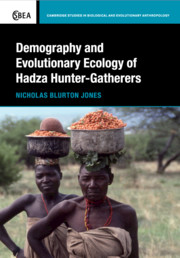Book contents
- Frontmatter
- Contents
- Preface and acknowledgments
- Part I Demography
- Part II Applying the demographic data to interpreting Hadza behavior and biology
- 12 Introduction
- 13 The outcome variables: fertility, child survival, and reproductive success
- 14 Men's and women's reputations as hunters, traders, arrow makers, and diggers
- 15 Marriage
- 16 Another dependent variable: growth as a proxy for fitness
- 17 Inter-birth intervals: a trade-off between fertility and offspring survival?
- 18 Grandmothers as helpers
- 19 Grandmothers and competition between the generations
- 20 Children as helpers
- 21 Husbands and fathers as helpers
- 22 Variation among hunter-gatherers: evolutionary economics of monogamy, male competition, and the sharing ethic
- References
- Index
22 - Variation among hunter-gatherers: evolutionary economics of monogamy, male competition, and the sharing ethic
from Part II - Applying the demographic data to interpreting Hadza behavior and biology
Published online by Cambridge University Press: 05 January 2016
- Frontmatter
- Contents
- Preface and acknowledgments
- Part I Demography
- Part II Applying the demographic data to interpreting Hadza behavior and biology
- 12 Introduction
- 13 The outcome variables: fertility, child survival, and reproductive success
- 14 Men's and women's reputations as hunters, traders, arrow makers, and diggers
- 15 Marriage
- 16 Another dependent variable: growth as a proxy for fitness
- 17 Inter-birth intervals: a trade-off between fertility and offspring survival?
- 18 Grandmothers as helpers
- 19 Grandmothers and competition between the generations
- 20 Children as helpers
- 21 Husbands and fathers as helpers
- 22 Variation among hunter-gatherers: evolutionary economics of monogamy, male competition, and the sharing ethic
- References
- Index
Summary
… in utterly barbarous tribes the women have more power in choosing, rejecting, and tempting their lovers, or of afterwards changing their husbands, than might have been expected.
Darwin, 1871, 912“Frankie! Bring the axe. This leopard wants to eat the baby.” Hadza man to Marlowe, midnight, camped by the road somewhere in Hadzaland.
In this chapter, I attempt a summary and an introduction to some questions that arise from the Hadza research. I will also discuss our data on male and female reproductive strategies, an arena of much controversy. Darwin's surprise should usefully upset our prejudices, and the importance of its contrast with the barbarities of the Victorian English marriage system will become evident. Before we jump to conclusions about rare but vital “father effects,” or become distracted by the image of a Hadza man without a bow by his side, note that as Frank Marlowe retold the events, the call came from the baby's very new step-father.
The Hadza data impinge on many issues in hunter-gatherer studies and biological anthropology. My range of issues may have been too wide. I must have missed many important references that could have simplified my task and clarified the results. My aim was to add more about the Hadza to the available data on hunter-gatherers. I cannot reanalyze all the important comparative accounts, such as by Walker et al. (2008), Kelly (2013), and others, but I will discuss Terashima's (1980) too long neglected suggestions about a forest–savanna dimension of warm climate hunter-gatherer variation. I will also suggest that human behavioral ecologists should not continue to neglect approaches to mating systems and to altruism that can widen our perspectives, and extend (with some associated risks) the aspects of behavior and society that can be tackled by an evolutionary ecology approach.
A summary of findings
My data support the general descriptions of many aspects of Hadza life by Woodburn (1968a,b, and subsequently) and Marlowe (2010). The richness of the Hadza environment (for hunting and gathering), the separateness of the sexes, their personal autonomy, and their mobility remain notable. The Hadza illustrate an egalitarian society in which food and other items are shared widely. Serial monogamy with rare polygamy is an adequate quick description of Hadza patterns of marriage. Many features of their marriages resemble those in large-scale societies (Chapter 15).
- Type
- Chapter
- Information
- Demography and Evolutionary Ecology of Hadza Hunter-Gatherers , pp. 437 - 460Publisher: Cambridge University PressPrint publication year: 2016



